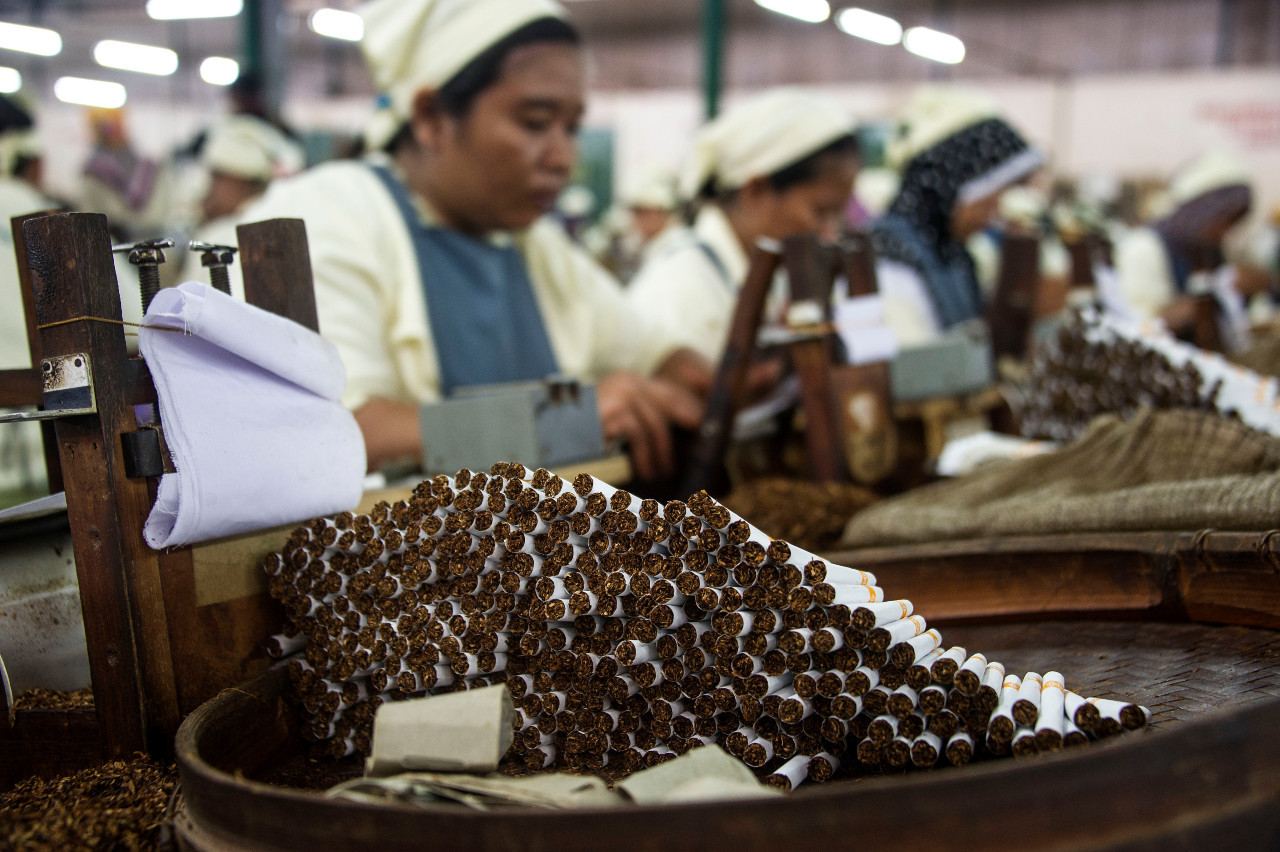Popular Reads
Top Results
Can't find what you're looking for?
View all search resultsPopular Reads
Top Results
Can't find what you're looking for?
View all search resultsReport names and shames countries cosy with Big Tobacco
A ranking of 57 countries based on their willingness to keep Big Tobacco at bay puts Japan and Indonesia at the bottom of the list, with Romania, China and Lebanon among the 10 worst offenders.
Change text size
Gift Premium Articles
to Anyone
 This picture taken on Jan.6, 2017 shows Indonesian workers handrolling clove cigarettes at the PT Wismilak Inti Makmur factory in Surabaya. There was a significant decline in the number of cigarette manufacturers in Indonesia since 2015, as a result of increases in excise tax,.while the remaining minor cigarette manufacturers continue to operate on a small scale or home industry basis, and distribute locally.
(AFP/Juni Kriswanto)
This picture taken on Jan.6, 2017 shows Indonesian workers handrolling clove cigarettes at the PT Wismilak Inti Makmur factory in Surabaya. There was a significant decline in the number of cigarette manufacturers in Indonesia since 2015, as a result of increases in excise tax,.while the remaining minor cigarette manufacturers continue to operate on a small scale or home industry basis, and distribute locally.
(AFP/Juni Kriswanto)
T
he global tobacco industry has aggressively lobbied governments during the COVID-19 pandemic to expand markets and blunt measures designed to curb their business, a report from watchdog groups aligned with the World Health Organization claimed on Tuesday.
A ranking of 57 countries based on their willingness to keep Big Tobacco at bay puts Japan and Indonesia at the bottom of the list, with Romania, China and Lebanon among the 10 worst offenders.
The United States is the lowest-ranked wealthy nation, with Malaysia, Spain, Germany and India also seen as too accommodating, said the report by non-profit groups based in France, England and Thailand.
"The tobacco industry has a well-documented history of deception and of capitalizing on humanitarian crises, and it is using the pandemic to attempt to improve its deteriorating public image," commented Adriana Blanco Marquizo, head of the secretariat for the World Health Organization Framework Convention on Tobacco Control.
Tobacco claims some eight million lives each year from cancer and other lung diseases, a million in China alone.
In several countries, stringent tobacco control measures were defeated or diluted.
Philip Morris International (PMI), for example, "lobbied for the promotion and sale of its heated tobacco product in a dozen countries", resulting in the lifting of bans, lower taxes, and a voice in government-led deliberations on regulating tobacco products, the report found.
Taxes on these new nicotine delivery devices are now lower than cigarettes in France, Germany and Japan.
Costa Rica, Zambia and Bangladesh also eased the tax burden for tobacco firms.
During the pandemic, tobacco firms have been handing out personal protective equipment, ventilators and hand sanitizers in countries across the world.
"While publicizing its charitable acts to resuscitate its image as being part of the solution, the industry was simultaneously lobbying governments not to impose restrictions on its business," the report said.
In Kenya, the government listed tobacco products as "essential products" during the pandemic, and in Jordon cigarettes were delivered with bread and other foods directly to neighborhoods.
In contrast, India and South Africa banned the sale of tobacco products during the pandemic.
Meanwhile, Big Tobacco has sued to block plain packaging for cigarettes, sponsored cultural events or sports teams, and challenged the legality of smoke-free zones.
The report was put together after former New York mayor Michael Bloomberg gave the researchers a three-year grant of $20 million to track how the industry markets its wares worldwide, especially in developing countries.
"This is the only product I know of where if you use it as advertised, it will kill you," Bloomberg told AFP in 2018, when he awarded the grant.
More than 80 percent of the world's 1.3 billion tobacco users live in low- and middle-income countries.
Smoking has plateaued in most rich nations, but in the developing world the total number of tobacco users - overwhelmingly men, especially the young - continues to climb.
The global tobacco market size was valued at nearly $850 billion in 2019.
The groups collaborating on the report included the Tobacco Research Group at the University of Bath, the Global Center for Good Governance in Tobacco Control and the International Union Against Tuberculosis and Lung Disease.









